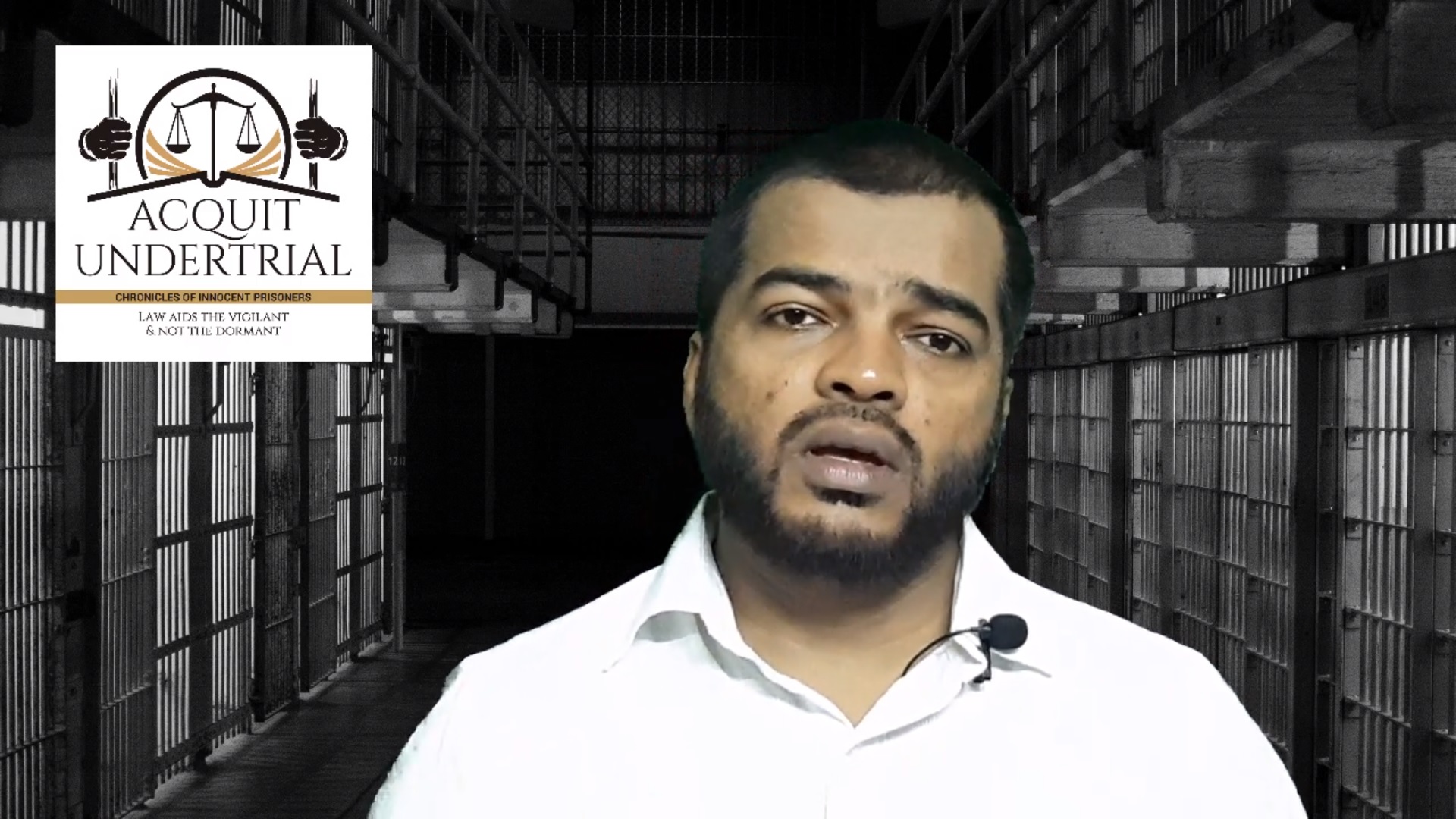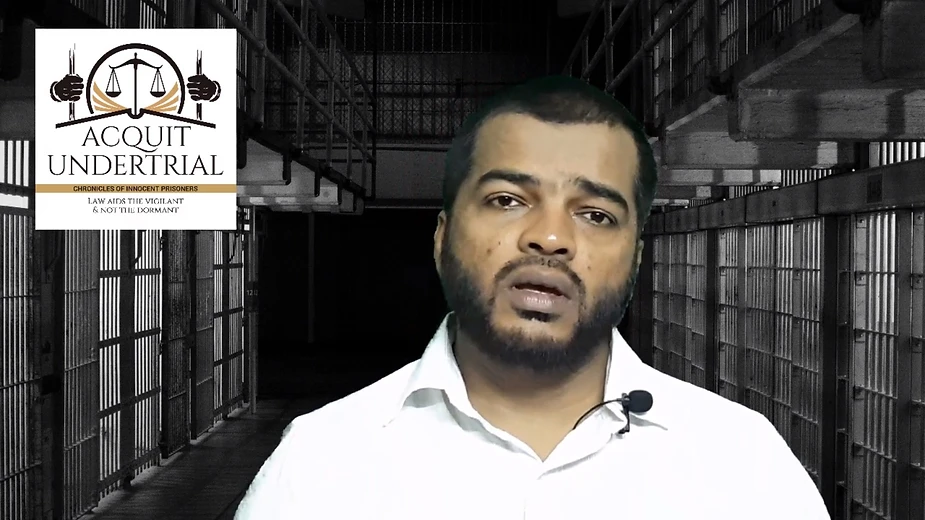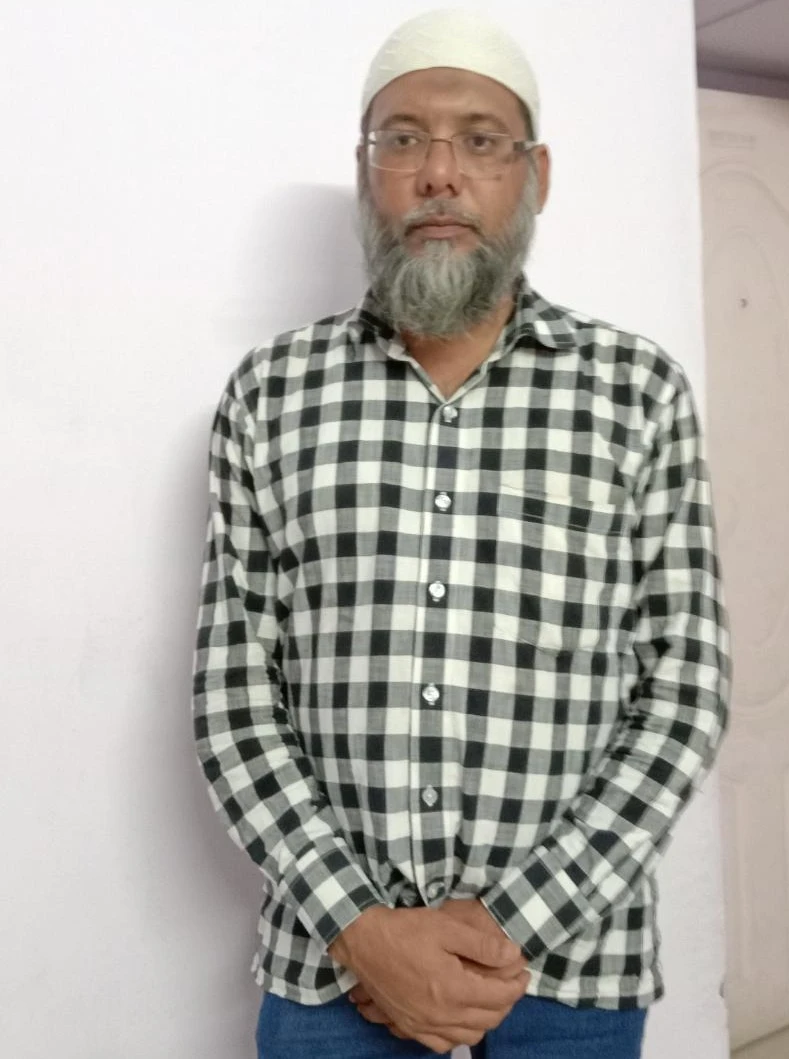xeuss
SENIOR MEMBER

- Joined
- Aug 22, 2019
- Messages
- 4,355
- Reaction score
- 6
- Country
- Location

The Lost Lives Of India’s Muslim Terror Suspects
Withdrawing money from your own savings account or attending a meeting at a mosque. On such evidence, the police accused six Muslim men of being terror operatives. Their arrests grabbed headlines, their acquittals were unnoticed and compensation was never given.
The Lost Lives Of India’s Muslim Terror Suspects
Withdrawing money from your own savings account or attending a meeting at a mosque. On such evidence, the police accused six Muslim men of being terror operatives. Their arrests grabbed headlines, their acquittals were unnoticed and compensation was never given.
AMIT KUMAR


A video grab of Wahid Shaikh's Youtube show.
Guwahati: It is not often that a school teacher misses 10 years of classes. Wahid Shaikh had a legitimate reason: he was one of those accused in one of India’s deadliest terrorist attacks, and it took a decade of trial and trauma before he was acquitted of all charges.
Shaikh, 42, was a suspect in the 11 July 2006 Mumbai train bombings, where 209 died and more than 700 were injured when seven bombs ripped through commuter trains in 11 minutes.
Shaikh will tell you of his trauma, torture and legal battle in compelling, often disturbing, detail. But he is not content with telling only his story. He has taken it upon himself to ensure that the stories of men like himself are heard by a wider audience.
In April 2015, after nine years in jail, when a special court acquitted Shaikh of all charges, he told himself he would not be caught off guard again. He decided to get a law degree and combine that with storytelling. When he was wrongfully arrested, he was also doing a PhD, so research, writing and narrating stories came easily to him.
In August 2020, he launched a YouTube series called Acquit Undertrial, which chronicled the lost years of Muslim men, falsely accused and incarcerated on charges of terrorism. His videos are uncomfortable to watch, even though they just have Shaikh speaking directly into the camera, almost blandly, with little change in expression.
“I was compelled to do this series because there are so many such stories that need to emerge,” Shaikh told Article 14.
On 15 October, Shaikh featured Bhopal’s Mohammed Noor, 51, a PhD in engineering. In 2002, Noor was accused of recruiting for and financially helping the Students Islamic Movement of India (SIMI), a banned organisation. Noor was convicted in a magistrate’s court in 2013, a ruling he challenged in a sessions court in 2014. Two years later, the sessions court acquitted Noor of all charges.
The court said the police were unable to provide any “compelling evidence”. The Rs 4.5 lakh recovered from Noor, which the police said was raised for SIMI activities, was Noor’s own money withdrawn from his savings account.
“His crime, in short, was that he withdrew money from his account,” said Shaikh.
In India, people can be accused of being terror operatives on the flimsiest of charges (here, here and here). A disproportionate number are Muslim, with many cases built on paper-thin evidence and police confessions that are legally inadmissible.
Arrests grab headlines, towns are vilified as “terror hubs” and acquittals almost always go unnoticed. The accused rarely get bail, and it is only when social organisations step in to provide legal support that they even stand a chance of getting justice. In all the six cases we investigated, there was no compensation.
Shaikh said the media, barring some outlets, such as TwoCircles.net (where I worked as a news editor and executive editor for four years tracking terror accused), largely ignore such stories. As a lawyer, Shaikh said, he understood the legalities of such cases. As a former convict, he knew the pain and anguish of those falsely accused.
‘Demoralise The Community By Attacking The Smartest’
In 2008, Azamgarh was at the centre of media attention in the post-9/11 world and the “war on terror”. The media were trying to figure out what was going on and explanations were coming fast. Here’s one from the Economic Times, headlined “Uttar Pradesh Biggest Terror Hub after J&K”:
“With a large number of young, uneducated and unemployed Muslim youth walking the streets aimlessly, the state has become a fertile ground for breeding terror. Terrorism, according to intelligence sources, began to grow roots in the state in 1985 when Azam Ghauri, a native of Andhra Pradesh, and Abdul Karim Tunda of UP set up a unit to provide logistics support to Lashkar-e-Taiba. Ghauri and Tunda, along with a Mumbai doctor, Jalees Ansari, had set off a series of explosions in the country in December 1993 - the first anniversary of the Babri Masjid demolition. This was the first known LeT strike in the country outside J&K. Since then almost all major terror attacks have had some UP connection.”
In those days, Azamgarh, located about 270 km south-east of state capital Lucknow, was the focus of attention. Within Azamgarh, it was, as the report shows, “the young uneducated and unemployed Muslim youth” who was the most important element of this network.
Gone were the days when poor, uneducated youth were arrested. The focus had shifted, almost exclusively, to educated Muslim youth.
Wahid Shaikh was a PhD student and a teacher, Parvej Khan was working with a newspaper, Asif Khan was a civil engineer, Yahya Kammukutty was a software engineer, Wasif Haider was working with a multinational company, Farogh Makhdoomi was a doctor. When this story was filed, the trial of Asif Khan, acquitted in two cases, was ongoing. The rest have been acquitted.
“When you arrest one educated, working person, you cripple a lot of people,” said Shaikh. “This is why you see so many arrests of educated, well-to-do people.”
Shaikh’s point is perhaps confirmed by the vilification of Bhatkal, a coastal town in Karnataka that became a sort of second phase of the “Azamgarh Terror Model”, when a string of arrests was made from the town after the 2008 Delhi serial blasts which killed 26 and injured 135.
Bhatkal has a Muslim-majority population but comes under Uttara Kannada district (Bhatkal taluka has two more areas under it: Jali and Venkatapura). The town has a literacy rate of 94.1%, higher than Uttara Kannada’s 84.1%, according to the 2011 Census. Bhatkal’s male literacy rate is 96.28%, and the female literacy rate is 91.86%.
After 2008, Bhatkal became forever associated with Yasin Bhatkal, the alleged mastermind of a banned outfit called the Indian Mujahideen. Yasin is not his real name, and he left Bhatkal in the early 2000s, as his brother told me in 2017, when I was doing an extended series there, but Bhatkal paid the price for its “terror hub” tag.
Despite its premier education facilities and more than a few hospitals, there was a severe shortage in 2017 of professionals, such as doctors (especially gynaecologists) and teachers.
The damage done to cities linked to terrorism is often irreparable, even though terror charges may be dropped in court. The government, a local journalist told me then, was trying to solve a problem they were not even sure existed.
The Law Is Not Your Friend
Terrorist and Disruptive Activities Act (TADA) convict Mohammed Nisaruddin Ahmad, who was a second-year student of pharmacy when he was arrested, spent 23 years in jail, and his case highlights all that is wrong with the criminal justice system when it comes to dealing with terror cases.
Nisaruddin was arrested by the Hyderabad police in January 1994 for carrying out multiple train bombings that took place across the country in December 1993. He was in illegal detention for over a month, he said during a conversation with this reporter in 2016.
The only evidence police produced was the alleged confession—the provisions of TADA were later invoked to make these admissible. But the confessions themselves told an interesting tale, and reveal how terror investigations and prosecutions are, often, conducted.
While arresting Nisaruddin, the Hyderabad police had made out a confessional-cum-recovery memo. However, since the so-called confession was made before an inspector-rank officer, it was not admissible as evidence even under TADA. Nisaruddin’s confessional statement was thereafter recorded before a senior police officer as required by section 15 of TADA.
Both ‘confessions’ were identical, word for word, comma for comma, full stop for full stop. By a strange chance, Nisaruddin found both documents in his chargesheet—someone had mistakenly annexed the confessional-recovery memo in his copy.
In May 1996, the designated TADA court in Hyderabad ordered the discharge of the accused under the provisions of TADA, directing the trial to be conducted under ordinary IPC sections.
The Andhra Pradesh government appealed against the local court’s rejection of TADA charges in the Supreme Court but received no reprieve.
The Supreme Court said the exercise of power under section 20 A (2) of TADA Act by the then police commissioner of Hyderabad was “very casual” and issued notice to show cause why “adverse remarks against him be not made,” The Indian Express reported.
The state government withdrew its appeal in 2001. By now, Nisaruddin and other accused, including his brother Zaheeruddin, were undergoing trial in a TADA court in Ajmer, Rajasthan, where, again, the confessional statement was the principal evidence.
Zaheeruddin’s story runs parallel to his brother, who is two years younger. He was picked in April 1994 from Mumbai, where he was a civil engineer. Zaheer spent the next 14 years in jail. The Supreme Court released him on bail on 9 May 2008 on health grounds after he was diagnosed with lung cancer. He fought his cancer and attended court every time he was needed until finally, both he and his brother were acquitted of all charges in 2016.
Nisaruddin, meanwhile, produced certified copies of the confessional statement to demonstrate its likeness to the custodial confession, as well as proof that the state of AP had withdrawn their appeal against the TADA court’s order.
Disregarding this, the designated TADA court in Ajmer sentenced him to life imprisonment.
In 2016, the Supreme Court observed that the document based on which Nisaruddin was convicted should not have been admissible as evidence. By this time, Nisaruddin had already spent 23 years in jail.
The question that both brothers ask is: what of the 20 years lost when the document was first rendered inadmissible by the Hyderabad TADA court and the SC’s recognition of that inadmissibility?
The story of Hanif Pakitwala is not very different.
The Pursemaker Who Lost his ‘Title’
On Monday, 28 April 2003, Pakitwala had dinner with his entire family, as he usually did, and went to sleep. Around 2 a.m., he woke up to the most unfamiliar sight: police officers from the crime branch with an arrest warrant.
Still groggy, Pakitwala had no option but to go with them. He did not see home for the next 13 years. His was one of the most difficult stories I reported during my time at TwoCircles.net.
Pakitwala was one of two people absolved of all charges in February 2017 by the Supreme Court for alleged involvement in what came to be called the Ahmedabad tiffin-bomb blast case in May 2002.
Pakitwala, who until then had never been to a police station, was a volunteer in the post-Godhra riot camps in Ahmedabad. He only found out that he and 21 others had been accused of the bombings when he was presented in the court on 1 May 2003.
During our conversation in 2017, Pakitwala said that the days after the first day in court were the worst. “At night, a bell would go off, and they (the police) would randomly pick one of us for questioning,” he said. “Of course, there was torture inflicted upon us. I was beaten black and blue at times; told to sign blank white pages and threatened with dire consequences if I failed to do so.”
As the days passed, and the cases against 16 of the 21 accused were dismissed, Pakitwala and the remaining four accused began to have hope.
“Hope can sometimes be dangerous,” he said. “It makes you oblivious to what is happening around you.”
He was right.
The five men were sentenced to 10 years imprisonment by the POTA court. Pakitwala said their lawyers may have made mistakes. “My family and I are not familiar with legalese,” said Pakitwala. “So, it was not like we knew what mistakes my lawyer made.”
When the case moved to the High Court, Pakitwala’s hopes revived, but soon he realised that the witnesses produced by the government were mouthing exactly what the police wanted them to say.
“I cannot even say I am angry at the witnesses...who knows, maybe they were threatened by the police too?” said Pakitwala. In January 2011, the Gujarat High Court convicted four men, including Pakitwala, awarding them life imprisonment. One was acquitted.
Pakitwala’s appeal was accepted in the Supreme Court after a few months, and a faction of the Jamiat Ulema-e-Hind stepped in to provide legal support.
On 2 February 2017, Pakitwala was acquitted.
Over the decade he was in jail, Pakitwala’s wife and mother died. He lost his business (the name Pakitwala was his family name as he came from a family of purse makers). His children, who were in school when he was arrested, dropped out and became hawkers to support the family.
The SIMI Membership Issue
A fleeting, past association with SIMI, banned in 2001, is enough to land you in trouble. But even if you were not associated with SIMI in any manner of form, it does not matter, as the cases of Shaikh and Parvej Khan show.
Parvej Khan, who used to work in an Urdu publication, spent five years in jail, accused of sedition and being an active SIMI member. He cannot read Urdu, can certainly not sign in Urdu, was never a member of SIMI (even before the organisation was banned in 2001) and the only proof was that he had attended a meeting of SIMI in 1998 in a local mosque. :


Parvej Khan says he won't ask the courts for compensation.
“The case went on for 15 years. My career was destroyed, I was a captive first in the district, then in jail, all because of a false charge. Who do I seek justice from when the system that is meant to protect us is after our lives with such vengeance?,” he told me in July 2020.
When asked about compensation, he dismissed the idea. “I do not even want to see the courts and police and all of them for a few years. I am free, I am thankful to Allah. Nothing more,” he added.
Parvej Khan is lucky. At least he is out and free, for now. The same cannot be said for Asif Bashir Khan. In 2015, Asif was convicted of housing and harbouring Pakistani terrorists at his Mira Road residence; procuring rexine bags, utensils, ammonium nitrate, detonators and helping assemble bombs in Mohammed Ali’s (another accused) house, along with planting the bomb which exploded in Borivali station.
Before 2006, there were two cases against Asif. One was under section 153-A of the Indian Penal Code (IPC) in 1999 for possession of a SIMI poster on Babri Masjid, while the other case was under section 120-B of the IPC in 2001 over his alleged involvement with some Jalgaon youth joining militancy in Kashmir in the late 1990s. He was acquitted from the SIMI case in 2014 by a sessions court and on 13 July 2020, the Aurangabad Bench of the Bombay High Court acquitted him in the other case. But since the 7 July terror blasts case is still ongoing, he is unlikely to be free anytime soon.
The larger ramifications of this case are “huge”, said Shaikh.
For the Maharashtra Control of Organised Crime Act (MCOCA) to be applied, there should be at least two chargesheets against accused over the past 10 years before the crime for which they have been arrested. Asif was indeed chargesheeted in two cases but acquitted.
“While there were cases against other members too, the state of Maharashtra used the cases against Asif to bring the matter in an MCOCA court, which in 2015 sentenced five people to death and a further seven to life imprisonment,” said Shaikh.
With the case under Section 120b set aside by Bombay HC, there is hope for the accused, Shaikh said. “In our appeal to the Bombay HC, we will attach the copies of the acquittal and ask them to review the death sentence in light of the same. As far as I know, the 2014 acquittal from the SIMI case was never challenged by the State of Maharashtra. This order also shows that the two previous cases were just used by the police for their advantage.”
Such cases highlight one important aspect. “There is nothing that is needed to build a case against Muslim youth,” said a lawyer who is currently working with the Jamiat-Ulema-e-Hind (Arshad Madni faction).
The lawyer, who chose to remain anonymous since one of his clients, a terror accused, is currently part of the ongoing trial, said one of his former clients was accused of helping organise meetings for SIMI. The proof offered, said the lawyer, was that he was active in the local masjid committee, and that masjid hosted SIMI meetings when the organisation was not banned.
“In 2003, my client was picked up and kept in jail for five years only to walk out free,” said the lawyer. “ The chargesheet was almost laughable…my client, a driver, was an alleged mastermind but the police could not even fabricate evidence properly. Yet, the case went on for five years.”
Advocate Shahid Nadeem, a Malegaon-based lawyer who also worked with the Jamiat-Ulema-e-Hind, said the only way that “such injustices” would ever stop is if preventive-detention laws are repealed. “The law is more in favour of police than ever,” said Shahid. “Every law has only given them more power while taking it away from people.”
“Once you are arrested, the court says ‘There is a prima facie case against the accused’,” said Shahid. “This itself means that courts tend to believe that the accused is guilty, to begin with. From there on, no legal clause will come to the rescue of the accused.”
Shahid emailed me a file with 245 names of Muslim men, charged under terror, sedition and preventive-detention laws, acquitted by various courts across the nation. I have not been able to verify each of these cases. They told the stories, he said, of hundreds of lives destroyed, countless hours wasted, millions of rupees spent, and decades lost.
“People need to realise that the victims of terror activities have never got justice,” said Shaikh. “How many more lives will we lose to such charges?”
(Amit Kumar is the former executive editor of TwoCircles.net).
